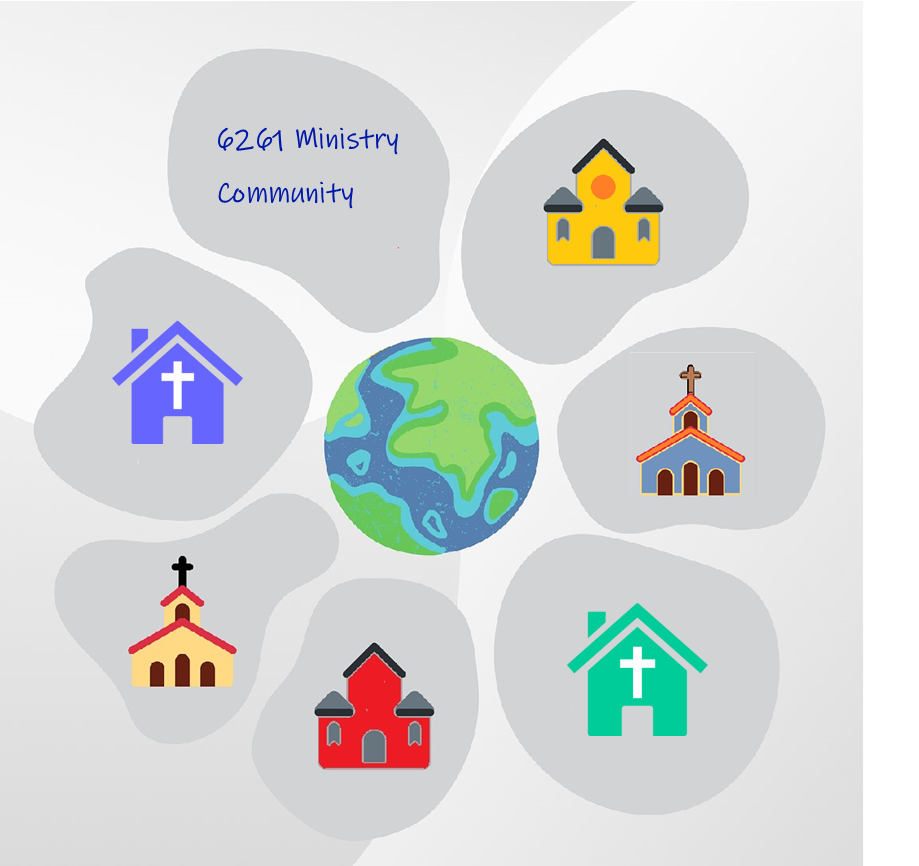





BENEFITS OF JOINING A 6261 MINISTRY COMMUNITY
6261 Ministry Communities promote vitality for all 6 of its congregations by providing:
- A collective pool of resources to support full-time pastors and deacons, in a time of clergy shortage and in a way that supports clergy health, as well as additional staff such as musicians, Christian education, administration, and more.
- A training structure for lay ministers and interns, allowing for a natural flow of trained leadership – some of whom may discern a call to public, rostered ministry.
- A means for staff and members to practice teamwork in a familiar network as they will have to rely on one another to fully support and sustain ministry.
- Built-in support for re-identifying values, mission, and community in the wake of Covid-19 and an ever-changing landscape.
- A deeper and broader training and accountability structure for councils, officers, committees, staff, rostered ministers, and lay ministers.
- Greater oversight to guard against financial malfeasance.
- Insight into the Church universal as congregations partner together for the sake of the Gospel, reaching beyond their individual doors and into the broader community.
- Increased opportunities for worship, Bible study, small groups, service, fellowship, and other faith practices.
Lay Ministers
Lay ministers vary in their theological backgrounds and training, gifts and passions for ministry, and their availability for service.
Lay ministers become licensed to serve in a 6261 Ministry Community after completing the synod-authorized discernment, training, certification, and deployment process, including the 2-year LLM (Licensed Lay Ministry) Program.
Lay Ministers are licensed by the Bishop to perform certain duties within specific congregations or 6261 Ministry Communities. These duties may include:
- Praying for the 6261 Ministry Community, its congregations, its surrounding community, and its ministries
- Leading Worship services, including preaching
- Leading Bible studies
- Leading and coordinating small groups
- Visiting those in the hospital, the homebound, and others who request a visit
- Potential for licensed Sacramental authorization in special circumstances
Deacons
Deacons are ordained to the roster of “Word and Service.”
As such, deacons share the Word through preaching and teaching. Deacons are uniquely called to the ministry of service, connecting the Church to the world and reminding all believers of our call to loving service of our neighbors.
Deacons are rostered ministers called by the Synod to a 6261 Ministry Community. They have completed a seminary-level theological degree with equivalent training and candidacy rostering requirements.
Deacons of 6261 Ministry Communities will be specifically responsible for:
- Praying for the 6261 Ministry Community, its congregations, its surrounding community, and its ministries
- Building relationships across the 6261 Ministry Community
- Equipping the 6261 Ministry Community for service embedded within the community
- Using their distinct and diverse ministry gifts, as well as their prophetic voice, for encouraging and integrating the primary ministry project of the 6261 Ministry Community
- With their 2 pastor colleagues, mentoring and supervising the 6 Licensed Lay Ministers in their contexts
- Leading worship, preaching, and setting the table for Holy Communion
- Coordinating with ministry teams and raising up leaders for faith in action
- Other ministries as determined by the 6261 Ministry Community such as leading Bible studies, small groups, visitation, teaching Confirmation, administration, etc.
Pastors
Pastors are ordained to the roster of “Word and Sacrament.”
As such, pastors are best known for preaching and teaching of the Word, along with presiding at the table for the sharing of the Sacrament of the Altar (Holy Communion). Pastors also perform the Sacrament of Baptism as well as other worship rites such as Confirmation/Affirmation of Baptism, Weddings, and Funerals.
Pastors are rostered ministers called by the Synod to a 6261 Ministry Community. They have completed a seminary-level theological degree with equivalent training and candidacy rostering requirements.
Pastors of 6261 Ministry Communities will be specifically responsible for:
- Praying for the 6261 Ministry Community, its congregations, its surrounding community, and its ministries
- Building relationships across the 6261 Ministry Community
- Leading worship, preaching, and providing Holy Communion
- Performing baptisms, weddings, and funerals
- Coordinating ministry teams and staff to plan worship services – including music, prayers, service setting, liturgical elements, creative opportunities, etc.
- Visiting those in the hospital, the homebound, and others who request pastoral care
- With their deacon colleague, mentoring and supervising the 6 Licensed Lay Ministers in their contexts
Ready to Get Started?
Grab your Vision Team, Congregational Council, or other Leadership Team and start thinking through this Narrative Inventory Form.
This Form helps the congregation think through its gifts, hopes, expectations, current partnerships, and potential for shared ministries that it could not do alone.


